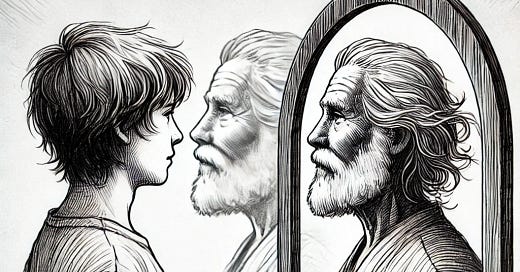In some moments, I feel both pleased and angry.
Sometimes, I hear about a concept and think, “That’s it—this is what I’ve been thinking of.”
Only, the idea I had was very fragmented.
And I wouldn’t have come up with a concept so precise.
So, thank you, Chris Williamson.
What are the unteachable lessons?
Chris Williamson introduced a concept on his podcast, Modern Wisdom: “unteachable lessons.”
The idea is that some lessons cannot be learned until they are experienced firsthand. No matter how many times you are told, you still have to live through them.
As Chris says “Unfortunately, they all seem to be “the big things” too. It’s never insights about how to put up level shelves or charmingly introduce yourself at a cocktail party”.
Those are the like:
Money won’t make you happy.
Fame won’t fix your self worth
You don’t love that pretty girl, she’s just hot and difficult to get
Nothing is as important as you think it is when you’re thinking about it
You will regret thinking too much
Worrying is not improving your performance
All your fears are a waste of time
You should see your parents more
You’ll be fine after the breakup and will be grateful you did it
It’s perfectly fine to cut toxic people out of your life
- Chris Williamson
Chris is onto something: We already know the most profound wisdom needed to be known. We know what to do, how to live, what’s important to us - but we don’t seem to believe it until we have had it experienced.
Stephen Covey says, Common sense is not common practice. What’s good for your happiness is often common sense, yet we struggle to act on it:
Be grateful.
Be more generous.
Think less about what you can get and more about what you can give.
The common theme in unteachable lessons is that they challenge our self-centeredness and attraction to superficial things.
That’s what makes them so hard to learn.
Do we actually learn anything outside experience?
Parallel to the idea of unteachable lessons, I pose another question: Do we truly learn anything without experience?
I’ve tried to read up on countless concepts, but until I’ve practiced them, they haven’t become real learning.
Why is this?
Experience includes emotions, while reading is “just” logical thinking.
Concepts are stored in the prefrontal cortex. While this part of the brain enables logical reasoning and decision-making, it is influenced by deeper, more emotional regions—such as the amygdala, hippocampus, and basal ganglia.
To fully understand a lesson, these emotional brain regions must also be engaged.
There’s a well-known neuroscience principle: Neurons that fire together, wire together. Merely hearing about a lesson doesn’t build strong neural pathways, but experiencing it does.
We might know something conceptually, but the ingrained mental frameworks in our brains are stronger—so we don’t truly understand until we live it.
What can you do about it?
If they are unteachable, are there antyhing to do about them?
We can try:
1. Take a chance
What if you have to take more chances?
Quit your job
Go through with a break up if the relationship has been hurting you for years
Go to the other side of fear even though it is uncomfortable
Move to another country (if you’ve been talking about it for years)
Have the tough conversation
What if you just gave a fuck about the bad consience you always have for relationship issues that you cannot control
Start before you feel ready
Maybe you need a push.
We humans love the “comfortable” status quo, even though it might kill us
If you “know” what the right thing is, take the chance.
2. Fall into the trap on purpose
We learn by experience, so maybe you just have to experience the alternative view.
Reach fame or money and see it doesn’t fix you
Take a high-status job only to see it makes you miserable
Reach your big goal and learn that this was never the silver bullet for you to feel whole
Buy the expensive stuff you’ve always wanted
Ignore the red flags of the one you’re dating and realize it hard later
Overwork and get burnt out
Of course these are better if avoided, but we are a stubborn species.
As Chris’ writing at the end:
… For everyone of these … I convinced myself that I was the exception of the rule.
We would give these advices to others, but we still fall prey to their alluring content.
3. Be patient (and possibly regret)
Some lessons require time and patience. The older we get, the more experiences we have.
Some lessons are learned through regret—regret that you didn’t take the chance, regret that you didn’t call more often.
Other lessons become clear when their allure fades. Priorities shift. The need for fame disappears.
Most lessons reveal themselves witdh time.
But we’d rather learn them sooner than later.




